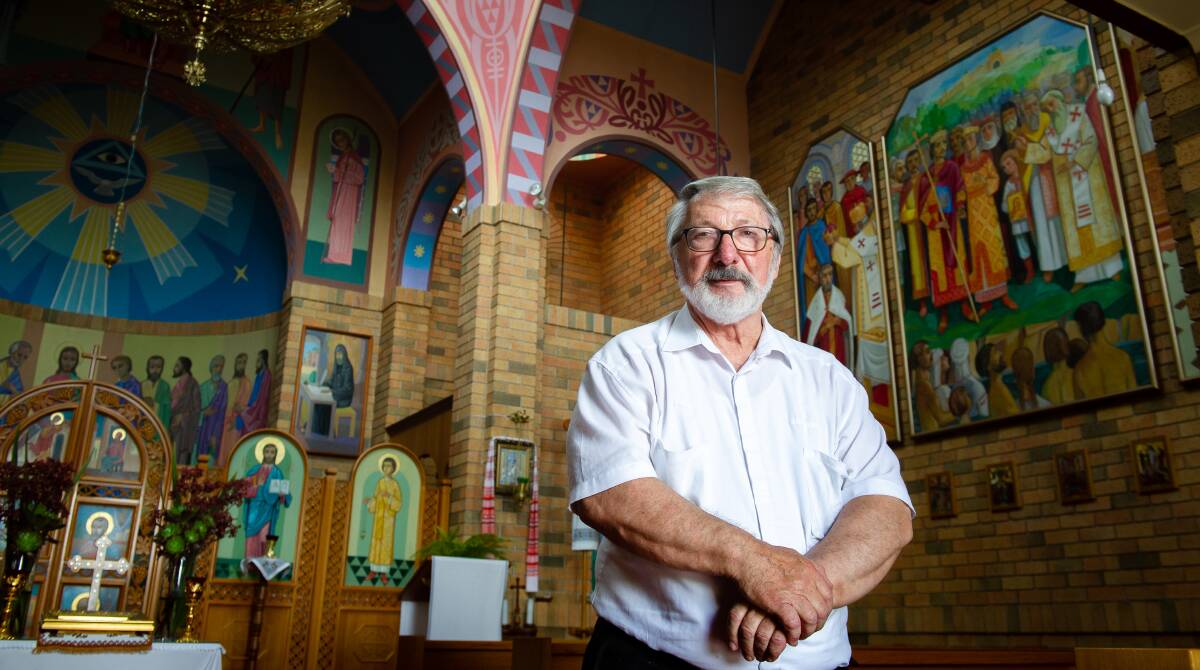Christmas will be different this year at St Volodymyr's Church in Lyneham. It will be on December 25 instead of early next year.
The Ukrainian Catholic church has changed to the western (Gregorian) calendar from the eastern, Russian calendar (the Julian calendar) where Christmas is celebrated in January.
"We've just converted to the Gregorian calendar," Father Wolodymyr (Wally) Kalinecki said.
"Russia celebrates with the Julian calendar and because of the terrible onslaught, we wanted to distance ourselves from Russia.
"We are praying for peace in Ukraine. If you are watching your own people getting killed, it's very distressing. We are praying for peace. Ukraine wants help but the world is not giving the help."
He said his sermon on Christmas Day at the service at 11am would be "according to the gospels". It would be Catholic theology - "the birth of our Lord" - but the backdrop will be the terrible events in Ukraine.
While services throughout Canberra on Christmas Day will be about the birth of Christ, there will invariably be a sense of events in the secular world intruding.
The Reverend David Campbell of St Andrews Presbyterian Church, in the shadow of Parliament House, planned to dwell on Bethlehem and its changed circumstances since Jesus was born there. Today it is a strife-torn city on the west bank of the River Jordan, occupied by Israel.
"I'll be talking about the current situation in the Middle East," he said.

He will also be using Bethlehem as a metaphor. Two-thousand years ago, it was a humble, non-metropolitan town and yet chosen as the site of a momentous event. It was small but immensely important in the great scheme of things.
Under the theme, "small is beautiful", Reverend Campbell will say that every human has great worth. "You may think you are of no great importance but in God's eye, you have great importance."
This idea of a troubled outside world intruding will also be addressed by the Catholic Archbishop of Canberra and Goulburn.
Archbishop Christopher Prowse said he would talk of the darkness in the world - what he calls a "fractured humanity" - and the light brought through the birth of Jesus.
He cited three areas of darkness:
"There is the continuing darkness of the wars in Ukraine, the Holy Land, Africa and other places. Let us not forget that war is always a defeat for humanity - here darkness is chosen over the light of love and peace-making.
"There is also the challenge in Australia of re-imagining our relationships with our Aboriginal and Torres Strait Islander people after the defeat of the Voice Referendum.
"Also, with the upward trend of the cost of living, this Christmas will be tough for so many to provide the necessities of table and shelter for their loved ones."
Archbishop Prowse believes that the church's message that there is hope should be one which non-Christians should and could also embrace.
He was in Israel just before the Hamas massacre there, and he noted that Gaza and Bethlehem, the birthplace of Christ, were about the same distance as the distance between Canberra and Goulburn. Darkness and light can be close together.
He believes that in dark times people should remember the light, the hope. "Love ultimately triumphs," he said.
The vicar of St John's Anglican Church echoed the sentiment that small did not mean insignificant. "The story of Jesus' humble origins is the archetypal case - there is an inverse relationship between the humility of his arrival and the greatness of his identity," the Reverend David McLennan said.
"Christians believe that Jesus' identity is inseparable from God's - that in him, humanity and divinity are forever reconciled. And yet he was born into, and lived in, extremely humble circumstances. True wealth and identity are not defined by financial and social measures."







